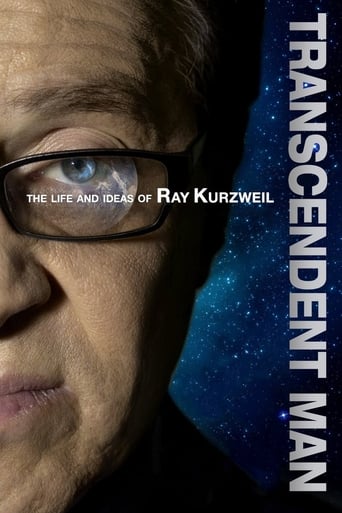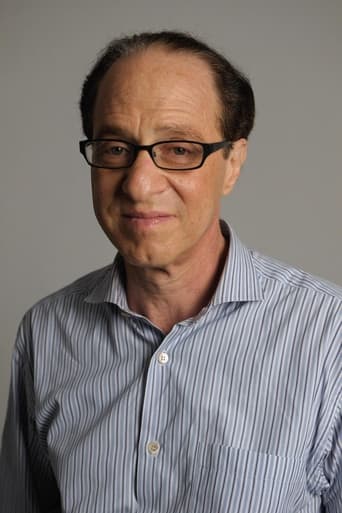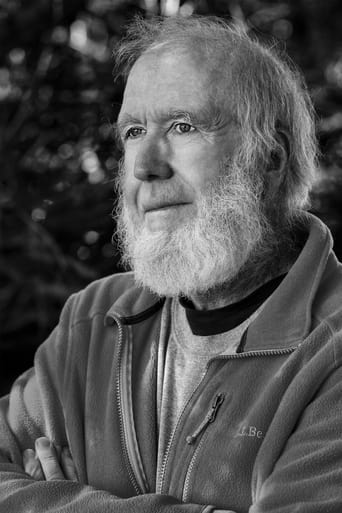Transcendent Man (2009)
The compelling feature-length documentary film, by director Barry Ptolemy, chronicles the life and controversial ideas of luminary Ray Kurzweil. For more than three decades, inventor, futures, and New York Times best-selling author Ray Kurzweil has been one of the most respected and provocative advocates of the role of technology in our future.
Watch Trailer
Cast


Reviews
Absolutely Fantastic
A Masterpiece!
At first rather annoying in its heavy emphasis on reenactments, this movie ultimately proves fascinating, simply because the complicated, highly dramatic tale it tells still almost defies belief.
There's no way I can possibly love it entirely but I just think its ridiculously bad, but enjoyable at the same time.
The documentary is, to an extent, a film version of Ray Kurzweil's nonfiction text, *The Singularity Is Near: When Humans Transcend Biology* (2006).If you're not familiar with Ray Kurzweil's ideas, then I recommend familiarizing yourself with them. I want to go so far as to say he comes closest to articulating the general "mythology" of our time in regards to our relationship with technology.This was a wonderful documentary to watch before reading his book. It's also interesting because the ambivalent nature of our relationship to technology comes through in an intense way. Indeed, the extremes of "technology-as-savior" and "technology-as-doom" are evident in this documentary. For example, Ray Kurzweil believes that, eventually, machine intelligence and human intelligence will merge together, and that the next stage of human evolution involves our connection to technology: this connection will result in immortality. And yet, other scientists believe that machine intelligence will stay separate from us and, surpassing us in capabilities, intelligence, vision, will come to see us as a mere "insects." Thus, they'll destroy us with as much prejudice as we destroy a nest of wasps or some irritating rabbits.We have here the vision of either technology as Utopia or technology as Dsytopia: the U.S.S. Enterprise or Skynet.A lot of the documentary foregrounds Kurzweil's views, but I wouldn't go as far as to say it's biased towards them. A lot of time is spent allowing his detractors to speak. Particularly, Hugo De Garis becomes the representative of the "dark side" of Kurzweil's technological vision. De Garis spends a lot of time talking about the "artilect war," a scenario he has imagined. The artiloect war, according to De Garis, will take place right before machines achieve consciousness. The war will be fought between people who think that intelligent machines should be built and people who believe intelligent machines are our doom and should not be built. We basically have, in De Garis's scenario, a fight between the two visions: those who recoil from technology as the death of humanity and those who embrace technology as the full manifestation of humanity (i.e. our destiny).There are other vexed issues in terms of our relationship to technology that come through in this documentary, namely, how we are coming to interface with it. One question is, where do the boundaries of the human end? After we have replaced our eyes, our lungs, our brains, our limbs with technological apparatuses, when do we stop being human and start being machines? This is a metaphysical question regarding the fundamental ontological nature of human being as an discrete experience.A lot of folks are reluctant to watch this documentary because they feel like Kurzweil is "just wrong." I think that's the wrong way of going about it. It doesn't really matter if he's right or wrong. What matters is that such visions are even being expostulated. That a man has written books claiming that technology will save us; that others have written books saying that technology will destroy us: these developments are culturally significant.They point toward our vexed relationship with technology, the degree to which we both love it. And hate it.
One part biography, one part brain food; as an appetizer to the thought path of noted futurist Ray Kurzweil, it can be difficult at times to separate fact from fragment over the course of this documentary. Kurzweil's favorite subject is one of increasing relevance, perhaps even by the minute: he seeks to pinpoint the moment of so-called "singularity," when mankind's built-in body chemistry will finally cross the line into his rapidly-developing technological and biological know-how. In short - how soon will we be able to back up our thoughts and feelings to an external hard drive, what sort of moral and philosophical arguments will be made for and against the practice, and where will the ball of wax roll after that debate is behind us? Though its post-production effects can get a bit over-the-top at times, reminding viewers more than once of the over-ambitious "world of tomorrow" predictions popular in the 1950s, the film is largely successful at fostering a curious sort of fascination with the current point in history and the staggering number of possibilities present within our lifetime. Kurzweil himself is to thank for much of that, as his smooth, relaxed speaking gives the impression that anything is possible, even if (as some of his detractors point out during the film's apex) he completely overlooks humanity's tendency to use such moments for evil causes as well as good. Intensely interesting stuff that effectively sows the seeds of conception.
Kurweil and many others have been chattering about their "Singularity" since at least the mid- 1990s. This is not the astronomical phenomenon, but is similarly dense. Basically, the notion that machines, specifically computers, will someday soon exceed the intelligence, cognitive, perceptual, analytical, and other mental powers of humans, and become "self-aware" and achieve consciousness. As seen in the Terminator movies, The Matrix, this has become one of the basic, stock tropes of science fiction, though it has been around in fundamentally the same form as present since the early 1980's, at least. Interesting stuff, and not only for entertainment purposes. And clearly machines will (and have already) become more able than humans at a wide range of tasks. From Big Blue beating Gary Kasparov at chess more than a dozen years ago, to welding robots in auto plants, machines do many things faster, and ultimately better than man. Persons under 20 have much less "data" in their heads, having come to rely so heavily on Wikipedia and Google (having been taught to do so by parents and teachers, in fact), and the online fact is up-to- the-minute and dead-accurate, isn't it? More reliable than what lies in your mind? No doubt computers will continue to increase in power, and in the influence they have on our lives. And we will come to rely even more on them than we do now.However, Kurweil, like almost all the other exponents of the Singularity, including those offering a much darker version of the future than Kurweil's, fails to understand and take account of a number of critical points. First, the notion of consciousness/awareness, and even of intelligence itself is poorly defined. Neurologists, brain scientists, psychologists, who study the human mind as a profession disagree fundamentally as to what these qualities even are, how they work, or why one individual human has them in abundance, another hardly at all. The human mind and brain may truly be the last frontier of science. We know less, understand less, about the brain and mind than we did of infectious disease in the early 19th century, and psychologists and brain scientists would agree. We are only making a bare beginning at understanding the brain and nervous system, and how it works, and how we actually use it.For Kurweil, or anyone else, to predict machines of any sort will attain human levels of consciousness, intelligence, or thought by 2040, or even by 2080 (two frequently cited dates) is a patent absurdity which takes no account of the state of neuro-science and psychology. Who will design or program this machine that emulates, then exceeds, the human brain/mind? In order to make a copy, you have to understand the original in every nuance. Not the kludgy, narrow silliness of "Eliza" or "Racter", but something that can reliably pass a Turing test and also learn. And as for self-awareness, that would be a trick, wouldn't it? You'd need some sort of reverse Turing test to apply to the machine. That's Kurweil's problem, and that of his colleagues. They are, none of them, professionals in medicine, psychology, brain science, or neurology, nor do any of them (that I am aware of) have ANY training in these disciplines. And until brain science advances a GREAT deal, I fear there is little hope of a machine that even approaches human consciousness, nor general ability and ADAPTABILITY and the ability to LEARN. For focused, targeted tasks there are super-human machines, and will be more and better every year. Futurists would do well to understand the question before giving out answers, especially extraordinary 'predictions.' There are computer scientists working with research physicians and brain scientists, each learning the others fields (a very healthy activity for progress into such a brave new world), and the most optimistic among them might predict a computer that you can actually have a real, spoken conversation with (on LIMITED subject matter) in another 20 years. As for a whole mind, anything coming anywhere NEAR to the overall human capacity for language, learning, problem solving, changing one's self to suit the environment (and the environment to suit one's self), and both analytical/logical thought as well as creative/lateral/syncretic thought, that will have to wait until we first understand what it is. Oh, of course. I forgot. What about the machine that improves and modifies itself when the lights are turned off? It'd first have to have a motive or some sort of imperative to do that, and more importantly, some model of what it was modifying itself INTO, and would have to understand that model at its essence, which is the whole problem and main barrier to the human endeavor towards this end. It's a catch-22: you need consciousness and human intelligence to build it, and to WANT to build it. So sorry Ray, it ain't gonna happen in your lifetime (and you should look elsewhere for the talents and ideas that will eventually get us there. They aren't to be found is CSE programs or Silicon Valley)."Transcendent Man" was a fun docu to watch. Kurweil is an articulate spokesman for his ideas, and a likable fellow. This is a thoughtful, well-made non-fiction film, and should spark a great deal of thought in those interested in the subject.
Seldom do technologists gain prominence for their prophesies. Our field, you see, values doing over thinking. You believe we'll be Tom Cruising over our Minority Report-esque holograms in 2020? Great. Now build it.But Ray Kurzweil is an exception. He's a man whose words do indeed speak louder than his actions. He famously predicted the year a computer will finally beat the best human chess players, among many other things (89 of his 109 predictions from 1999 have so far been proved right.) His actions haven't been too unimpressive either — he built a computer at age 17 (in 1965 no less) and invented a reading machine for the blind.So we've established he's an Important Man. Now let's see what makes him Transcendent.In Transcendent Man, Mr. Kurzweil gives us a lowdown of what we are to expect from the next couple decades. Namely: robots will take over us, we'll start planting chips made of nanotechnology into our bodies, genetic modification will make us immortal, and soon enough, singularity. Whatever that means.The documentary follows Kurzweil in his daily life as he meets with smart people in lab courts, and William Shatner, to whom he successfully sells the idea of taking 150 pills a day (after all, we do want to see Captain Kirk witness the launch of the real Enterprise someday, no?)We get a glimpse of the labs and institutions where the apparent future of mankind (or the beginning of the apocalypse to some) is being initiated. They all utter the same phrases, and even the naysers appear to be cheer leaders of human triumph. Did I mention? Robots. Genetics. Nanotech. Immortality. Singularity.BOOM.If you ask me, he's being optimistic. But then again, he knows something the rest of us don't — the true power of the exponential curve. All technology, you see, advances exponentially. Moore's Law told us the number of transistors on a chip doubles every two years. Thirty two years after the first personal computer, we had one that sits in our pocket and lets us FaceTime our grandparents. Mark Zuckerberg recently made the claim that we're individually sharing double of everything year after year. I don't want to think about what this means for the pornography industry in 2020.And lest you forget? Four years ago, Twitter was a seven letter word in the dictionary. Three years before that, "Facebook" referred to a book with pictures you wouldn't want your kids to see. Today, these terms are something most of us live and die by everyday.Keeping this in mind, I guess it's possible that Mr. Kurzweil's predictions may not end up too far from the truth. Who knows what we'll be verbing in 2020?Ask Ray Kurzweil.






